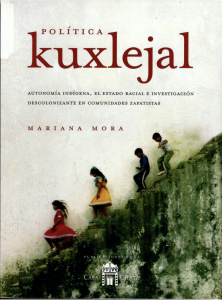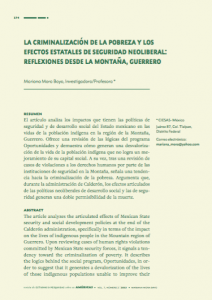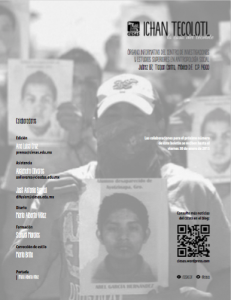
Mariana Mora is an associate professor – researcher at the Center for Research and Higher Studies in Social Anthropology in Mexico City. She earned her PhD in Anthropology from the University of Texas at Austin and an MA in Latin-American Studies from Stanford University. Her research interests include: social movements and State formation; decoloniality; legal anthropology; and the production of gender and racialization. She is currently concluding her manuscript entitled, The Decolonization of Politics: Zapatista indigenous autonomy and the neoliberal State. She is co-editor of the book, Luchas Muy Otras: Zapatismo y Autonomía en Comunidades Indígenas de Chiapas (2011) and autor of diverse publications on indigenous rights, decolonial politics and Zapatismo, including, “La politización de la justicia zapatista frente a los efectos de la guerra de baja intensidad en Chiapas”, In, Justicias indígenas y Estado: Violencias contemporáneas, María Teresa Sierra, Rachel Sieder, Rosalva Aída Hernández Castillo (coord). Mexico: CIESAS, FLACSO; “Las experiencias de la autonomía indígena Zapatista frente al Estado neoliberal Mexicano”. In, La autonomía a debate: políticas de reconocimiento y Estado plurinacional en América Latina, Co-edited by Miguel González, Araceli Burguete, Santiago Ortiz. Her most recent project focuses on the State violence, criminalization, processes of racialization and use of rights regimes in the state of Guerrero.
Chapter in book: POLÍTICA KUXLEJAL
Over the past two decades, Zapatista indigenous community members have asserted their autonomy and self-determination by using everyday practices as part of their struggle for lekil kuxlejal, a dignified collective life connected to a specific territory. This in-depth ethnography summarizes Mariana Mora’s more than ten years of extended research and solidarity work in Chiapas, with Tseltal and Tojolabal community members helping to design and evaluate her fieldwork. The result of that collaboration—a work of activist anthropology—reveals how Zapatista kuxlejal (or life) politics unsettle key racialized effects of the Mexican neoliberal state. Through detailed narratives, thick descriptions, and testimonies, Kuxlejal Politics focuses on central spheres of Zapatista indigenous autonomy, particularly governing practices, agrarian reform, women’s collective work, and the implementation of justice, as well as health and education projects. Mora situates the proposals, possibilities, and challenges associated with these decolonizing cultural politics in relation to the racialized restructuring that has characterized the Mexican state over the past twenty years. She demonstrates how, despite official multicultural policies designed to offset the historical exclusion of indigenous people, the Mexican state actually refueled racialized subordination through ostensibly color-blind policies, including neoliberal land reform and poverty alleviation programs. Mora’s findings allow her to critically analyze the deeply complex and often contradictory ways in which the Zapatistas have reconceptualized the political and contested ordering of Mexican society along lines of gender, race, ethnicity, and class.
Chapter in Book: “DEBEMOS CREAR OTROS CONCEPTOS QUE GENEREN UN DESPLAZAMIENTO PROFUNDO DE LO QUE AHORA DESCRIBIMOS COMO FEMINISMO HEGEMÓNICO”
An essay that pulls together a series of critical reflections from a decolonial feminisms perspective in relation to “hegemonic feminisms”.
Academic Article: La Criminalización de la Pobreza y los Efectos Estatales de Seguridad Neoliberal
The article analyzes the articulated effects of Mexican State security and social development policies at the end of the Calderón administration, specifically in terms of the impact on the lives of indigenous people in the Mountain region of Guerrero. Upon reviewing cases of human rights violations committed by Mexican State security forces, it signals a tendency toward the criminalization of poverty. It describes the logic behind the social program, Oportunidades, in order to suggest that it generates a devalorization of the lives of those indigenous populations unable to improve their social and cultural capital. The article argues that the effects of this security – development nexus generate double permissibility of death.
journalistic article: CORAZONANDO EL PODER COLECTIVO
In this article, the author analyzes the political meetings of the Consejala María de Jesús Patricio, in the context of the national campaign to get the electoral registration of the Indigenous Council of Government (CIG). She analyzes the indigenous epistemologies that are expressed in her political discourses.
Journalistic Article: AYOZTINAPA, VIOLENCIA Y EL SENTIDO DEL AGRAVIO COLECTIVO
The article analyzes diverse expressions of social demands in the Mountain region of the state of Guerrero in relation to the disappearance of 43 students from the Ayoztinapa teacher’s college. It offers three reflections on the role of anthropology in contexts of violence. The first refers to the collective sense of the grievance that situates the case of Ayotzinapa as part of a long-term accumulation of violence. The second aspect focuses on the current conditions of insecurity as the articulated effect of security and neoliberal development policies of the Mexican state. Thirdly, the article suggests that the case of Ayotzinapa leads anthropologists to adjust theoretical frameworks and research methodologies to respond to generalized contexts of violence in the country.
CIESAS MARIANA MORA
RED DE FEMINISMOS DESCOLONIALES
Contact: marmorab@gmail.com


